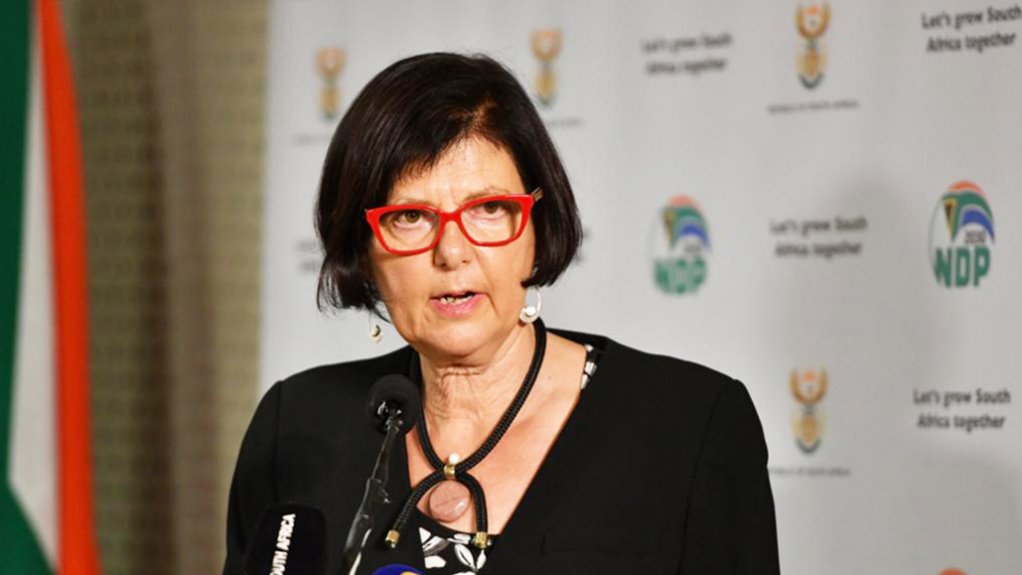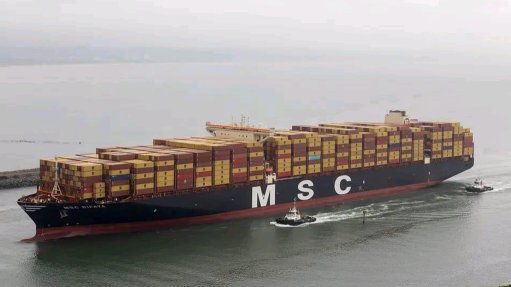Creecy welcomes progressive carbon tax increases
Forestry, Fisheries and the Environment Minister Barbara Creecy has welcomed the announcement by Finance Minister Enoch Godongwana that government plans to progressively increase the carbon price every year to reach $20/t of carbon dioxide equivalent (CO2e) by 2026, $30/t of CO2e by 2030 and $120/t of CO2e by 2050.
“This policy trajectory for the carbon tax really will be very helpful in allowing us to achieve the Nationally Determined Contribution that we submitted for 2025 and 2030 to the United Nations in October last year,” she noted.
Speaking at the launch of the Mapungubwe Institute for Strategic Reflection’s (Mistra’s) new research publication ‘A Just Transition to a Low Carbon Future in South Africa’ on February 24, Creecy said the global transition to a low-carbon economy had already begun and that South Africa needed to keep pace if it wants to remain competitive.
“Countries that are investing significantly in low-carbon technologies will seek to protect these investments with a range of non-tariff and border tax adjustments. Unless we join the technological transition that is taking place across the globe, our economy risks being left behind,” she said.
If South Africa fell behind, the country would face redundancy and non-competitive exports owing to the high-carbon footprint inherent in South African production processes.
Despite the sense of urgency, Creecy said the extension of the first phase of South Africa’s Carbon Tax by three years to December 31, 2025 – announced in Godongwana’s Budget speech on February 23 – would allow government time to ensure the relevant “architecture” is in place and also to allow the National Assembly to properly consider the Climate Bill.
“There’s always been concerns raised around carbon budgets, carbon tax and all of these kinds of transitional agreements. I think that what this is doing is giving us a bit of space . . . so that we can sort out all the mechanisms and modalities,” she told Engineering News.
Carbon budgets are required by the United Nations Framework Convention on Climate Change (UNFCCC) but carbon tax is a domestic measure that is not required by the UNFCCC.
“Part of what we’ve got to work out is how these two things will work together and I think that the extension of the current jurisdiction gives us a bit of space to do that because we’re not sure how long it’s going to take for the Climate Bill to go through the National Assembly,” Creecy added.
She noted that, were it up to her, the Climate Bill would be passed by the end of the year.
Creecy said that, in the meantime, government had produced and adopted a national decarbonisation adaptation strategy and that it was working with provinces and municipalities across the country to “mainstream climate resilience”. This was to ensure that all the work needed over the next 10 to 15 years to improve climate resilience in South Africa was mainstreamed into planning and into budgeting, she said.
Mistra’s new publication aims to address all of these issues, broadening the discourse on how South Africa might effect a just transition to a low-carbon transition and explore the opportunities in, and impediments to, making the transition fair, affordable and socioeconomically viable.
South Africa has adopted a just transition framework and set a path for the low-carbon transition as outlined in the National Development Plan and the Integrated Resource Plan. However, it remains critical to interrogate how South Africa can ensure a just transition to a low-carbon economy.
The core focus of the research is the shift from the traditional economic development pathway that focuses solely on economic growth towards one that also considers the environment and broader society.
“A critical element in the discourse is about a disastrous impact of global warming on the poor. However, depending on how it is handled, the transition to a low-carbon future can itself further worsen the conditions of life of the marginalised. It is therefore necessary to go beyond technicist, ecological interventions to a broader transdisciplinary approach to this challenge,” Mistra executive director Joel Netshitenzhe said at the launch.
The interlinked crises of biodiversity and ecosystem loss, climate change, energy insecurity and widespread poverty and inequality have created a window of opportunity for radical policy transformations that can simultaneously address them all together if handled well, leading to a just transition, he added.
“This transition will only succeed if it helps us not only to address climate risk, but help us with our broader development challenges,” Creecy concluded.
Article Enquiry
Email Article
Save Article
Feedback
To advertise email advertising@creamermedia.co.za or click here
Comments
Announcements
What's On
Subscribe to improve your user experience...
Option 1 (equivalent of R125 a month):
Receive a weekly copy of Creamer Media's Engineering News & Mining Weekly magazine
(print copy for those in South Africa and e-magazine for those outside of South Africa)
Receive daily email newsletters
Access to full search results
Access archive of magazine back copies
Access to Projects in Progress
Access to ONE Research Report of your choice in PDF format
Option 2 (equivalent of R375 a month):
All benefits from Option 1
PLUS
Access to Creamer Media's Research Channel Africa for ALL Research Reports, in PDF format, on various industrial and mining sectors
including Electricity; Water; Energy Transition; Hydrogen; Roads, Rail and Ports; Coal; Gold; Platinum; Battery Metals; etc.
Already a subscriber?
Forgotten your password?
Receive weekly copy of Creamer Media's Engineering News & Mining Weekly magazine (print copy for those in South Africa and e-magazine for those outside of South Africa)
➕
Recieve daily email newsletters
➕
Access to full search results
➕
Access archive of magazine back copies
➕
Access to Projects in Progress
➕
Access to ONE Research Report of your choice in PDF format
RESEARCH CHANNEL AFRICA
R4500 (equivalent of R375 a month)
SUBSCRIBEAll benefits from Option 1
➕
Access to Creamer Media's Research Channel Africa for ALL Research Reports on various industrial and mining sectors, in PDF format, including on:
Electricity
➕
Water
➕
Energy Transition
➕
Hydrogen
➕
Roads, Rail and Ports
➕
Coal
➕
Gold
➕
Platinum
➕
Battery Metals
➕
etc.
Receive all benefits from Option 1 or Option 2 delivered to numerous people at your company
➕
Multiple User names and Passwords for simultaneous log-ins
➕
Intranet integration access to all in your organisation





















